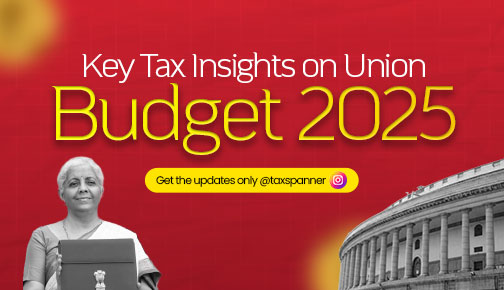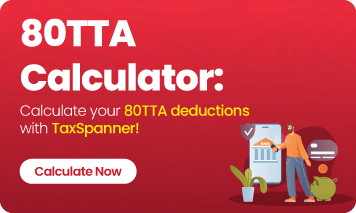Maximize Your Savings: Top Tax-Saving Investments for 2025
Oliver Wendell Holmes Jr. said that ‘Taxes are the price we pay for a civilized society,’ which encapsulates the essence of taxation. Taxes fuel the very framework that supports public services, infrastructure, and social programs essential for a functioning society. Understanding and optimizing your taxes is not just about compliance – it’s about guaranteeing that you contribute your fair share while also maximizing the financial benefits available to you. This is where TaxSpanner steps in, offering expert solutions that help individuals navigate the complexities of the tax system effectively. As we are approaching 2025, staying tax-efficient will be more critical than ever, and we’re here to guide you through the top tax-saving investments for 2025 with this blog.
| Tax Saving Investment | Returns | Lock-in Tenure |
|---|---|---|
| ELSS Fund | Not Fixed | 3 years |
| National Pension Scheme (NPS) | 9% – 12% | Till retirement |
| Unit Linked Insurance Plan (ULIP) | Not Fixed | 5 years |
| Public Provident Fund (PPF) | 7.1% | 15 years |
| Sukanya Samriddhi Yojana | 7.6% | 21 years or till marriage |
| National Savings Certificate | 6.8% | 5 years |
| Senior Citizen Saving Scheme | 7.4% | 5 years |
| Bank FDs | 5.5% – 7.75% | 5 years |
ELSS (Equity-Linked Saving Scheme) Mutual Fund
Equity-Linked Saving Schemes (ELSS) are tax-saving mutual funds that provide a dual benefit: tax deductions under Section 80C and potential wealth growth through market-linked returns. While ELSS investments have a lock-in period of three years, they offer one of the shortest tenures compared to other 80C investments. The interest rates on ELSS funds range from approximately 5% to 18%, depending on the market performance of the underlying equities. However, returns are not fixed, and there is a level of risk involved. Any long-term capital gains (LTCG) exceeding Rs. 1 lakh from ELSS funds are taxed at 10%. ELSS is best suited for individuals who have a high-risk appetite and seek flexibility and potential high returns.
National Pension Scheme (NPS)
The National Pension Scheme (NPS) is an excellent tax-saving option that caters to both government and private sector employees. Managed by the Pension Funds Regulatory and Development Authority (PFRDA), NPS aims to secure your financial future post-retirement. Anyone between the ages of 18 and 70 can join the scheme. NPS offers multiple fund options, including equities, corporate bonds, and government securities, allowing investors to tailor their portfolios according to their preferences and risk appetite. Under Section 80C, a self-contribution of up to Rs. 1.5 lakh is eligible for a tax deduction, and an additional Rs. 50,000 can be claimed under Section 80CCD(1B). This results in a combined tax benefit of up to Rs. 2 lakh. Employer contributions to the NPS are also tax-deductible under Section 80CCD(2).
Unit Linked Insurance Plan (ULIP)
Unit Linked Insurance Plans (ULIPs) combine insurance with investment, making them a versatile tax-saving option. The premium paid toward ULIPs qualifies for a deduction under Section 80C, up to a limit of Rs. 1.5 lakh. Additionally, the maturity amount received is tax-free under Section 10(10D). ULIPs allow policyholders to choose between equity, debt, or a combination of funds, depending on their financial goals and risk tolerance. They have a minimum lock-in period of five years, and switching between fund options is also tax-exempt. With ULIPs, investors can enjoy the benefits of financial protection and capital appreciation.
Bank Fixed Deposits (FDs)
Bank Fixed Deposits (FDs) are one of the most secure tax-saving investment options. They provide a guaranteed return and a fixed interest rate over a specified lock-in period of five years. In cases of joint accounts, the primary holder can avail the tax deduction benefit. This option is particularly advantageous for senior citizens, as they receive a higher interest rate compared to regular investors. However, premature withdrawals are not permitted in tax-saving FDs. By investing in a tax-saving Fixed Deposit, an investor can claim a deduction of up to Rs. 1.5 lakh under Section 80C of the Income Tax Act.
Public Provident Fund (PPF)
Public Provident Fund (PPF) is a long-term tax-saving investment that offers a triple tax exemption (EEE status) – the investment, interest earned, and the maturity proceeds are all tax-free. The interest rate for PPF is currently 7.1%, and the lock-in period is 15 years, making it suitable for those looking for stable, long-term growth. PPF accounts can be opened at designated banks or post offices and can be transferred from one branch to another. Contributions up to Rs. 1.5 lakh are eligible for a tax deduction under Section 80C. While the lock-in period is lengthy, partial withdrawals are permitted after the sixth year, providing some degree of liquidity.
Sukanya Samriddhi Yojana (SSY)
The Sukanya Samriddhi Yojana (SSY) is a government-backed scheme designed specifically to secure the financial future of the girl child. Under the ‘Beti Bachao, Beti Padhao’ initiative, SSY allows parents to save for their daughter's education and marriage. The scheme offers a higher interest rate of 7.6% and qualifies for a tax deduction under Section 80C. Contributions can start with as little as Rs. 250 annually, with a maximum cap of Rs. 1.5 lakh per year. The SSY matures after 21 years from the date of account opening or at the time of the girl child’s marriage. The interest accrued and maturity proceeds are exempt from tax, making this a highly attractive option for those planning for their child's future.
National Savings Certificate (NSC)
National Savings Certificate (NSC) is a low-risk, government-backed fixed-income investment. It offers a guaranteed return of 6.8% and has a lock-in period of five years. The investment made under NSC qualifies for a tax deduction of up to Rs. 1.5 lakh under Section 80C. Additionally, the interest earned is reinvested, making it eligible for further tax benefits. While the interest is taxable at maturity, the principal amount qualifies for a tax deduction. NSC is ideal for conservative investors seeking assured returns.
Senior Citizen Savings Scheme (SCSS)
The Senior Citizen Savings Scheme (SCSS) is tailor-made for individuals above 60 years of age, offering a higher interest rate of 7.4%. It has a lock-in period of five years, which can be extended for an additional three years. SCSS investments qualify for a tax deduction under Section 80C, up to Rs. 1.5 lakh. While the interest is taxable, it is paid out quarterly, providing regular income. This scheme is a safe and stable option for senior citizens looking for steady returns.
Tax-Saving Options Beyond Section 80C
Apart from Section 80C, there are several other deductions available under the Income Tax Act that can help reduce your taxable income. Some of these include:
- Section 80D: Deduction on health insurance premiums.
- Section 80E: Interest on education loans.
- Section 80TTA: Interest earned from savings accounts.
- Section 80TTB: Interest on deposits for senior citizens.
- Section 24(b): Deduction on home loan interest.
- Section 80GG: Deduction on house rent paid.
- Section 80G: Donations to charitable organizations.
- Section 80GGC: Donations to political parties.
- Section 80DD: Deduction for expenses on disabled dependents.
- Section 80DDB: Deduction for treatment of specific diseases.
- Section 80U: Flat deduction for individuals with disabilities.
Interest Earned from Savings Account Deposits under Section 80TTA
All taxpayers can benefit from a tax deduction on interest earned from savings accounts, subject to certain limits. This applies to savings accounts held in banks, post offices, and cooperative societies engaged in banking activities. This tax-saving option is available exclusively for ordinary taxpayers, excluding senior citizens.
The maximum deductible amount under this section is Rs. 10,000, encompassing the interest accrued from all savings accounts held by the taxpayer. Any interest earned beyond this threshold is subject to taxation.
For senior citizens, Section 80TTB offers enhanced tax benefits. They can claim a deduction of up to Rs. 50,000 on interest income from specified sources, further alleviating their tax burden.
Interest Paid on Education Loans under Section 80E
Students who take out loans to pursue their education can avail themselves of tax exemptions on the interest repayments under Section 80E. Notably, there is no upper limit on the deduction amount. Taxpayers can begin claiming this deduction from the financial year they start repaying the interest on their education loan, continuing for up to seven years, or until the loan is fully repaid, whichever comes first.
Health Insurance Premiums and Medical Expenses for Senior Citizens under Section 80D
Taxpayers can claim deductions for premiums paid on health insurance and medical expenses under Section 80D. The exemption limits depend on the taxpayer's family situation:
| Eligibility | Exemption Limit | Eligibility |
|---|---|---|
| Health insurance for self, spouse, and dependent children | Rs. 25,000 | Health insurance for self, spouse, and dependent children |
| Health insurance for self, family, and parents | Rs. 50,000 (Rs. 25,000 + Rs. 25,000) | Health insurance for self, family, and parents |
| Health insurance for self, family (below 60) & parents (above 60) | Rs. 75,000 (Rs, 25,000 + Rs. 50,000) | Health insurance for self, family (below 60) & parents (above 60) |
| Health insurance for self, family (with members above 60) & senior citizen parents | Rs. 1,00,00 (Rs. 50,000 + Rs. 50,000) | Health insurance for self, family (with members above 60) & senior citizen parents |
Home Loan Interest Payments under Section 24(b)
Under Section 24(b), taxpayers can claim deductions on interest payments made toward home loans. For self-occupied properties, the maximum deduction limit is Rs. 2 lakhs. However, if the property is rented out, there is no cap on the deduction, allowing taxpayers to claim the entire interest amount.
Life Insurance Plan Maturity Payouts under Section 10(10D)
Incomes received from a life insurance policy upon maturity, surrender, or upon the policyholder's death are completely tax-free under Section 10(10D).
House Rent Paid (No HRA) under Section 80GG
For individuals who do not receive a House Rent Allowance (HRA) in their salary – often the case in small and medium-sized enterprises – it is possible to claim deductions for rent paid on furnished or unfurnished accommodations under Section 80GG. Self-employed individuals can also benefit from this deduction. To qualify, taxpayers must meet the following conditions:
- No HRA received during any part of the financial year.
- No house owned in the city of employment.
- No house owned in the city by the taxpayer’s spouse, minor child, or Hindu Undivided Family (HUF).
- Ownership of a house in another city is permissible, provided it is not self-occupied or vacant.
The maximum deduction allowed is the lesser of the following:
- Rent paid exceeding 10% of total income.
- 25% of total income after adjustments.
- Rs. 5,000 per month, resulting in a maximum annual deduction of Rs. 60,000.
House Rent Paid (HRA) under Section 10(13A)
For those receiving HRA, the Income Tax Act (Section 10(13A)) offers tax benefits based on the minimum of the following:
- Actual annual HRA provided by the employer.
- 50% of basic salary plus dearness allowance (DA) for metro cities or 40% for non-metro cities.
- Actual rent paid minus 10% of basic salary plus DA.
(Note: DA is considered if it contributes to retirement benefits.)
Charitable Donations under Section 80G
Taxpayers can claim deductions for donations made to approved charitable institutions under Section 80G, provided these donations are made through non-cash means. Cash donations exceeding Rs. 2,000 are not eligible. A stamped receipt detailing the trust's name, address, PAN number, donation amount, and other relevant information is necessary for claiming this deduction.
Donations for Scientific Research and Rural Development under Section 80GGA
Tax deductions can be claimed for donations made toward scientific research and rural development under Section 80GGA. There is no upper limit on the deduction, with 100% of the amount spent qualifying, provided that donations over Rs. 10,000 are made through a bank account.
Political Party Donations under Section 80GGC
Donations made to registered political parties are fully tax-deductible under Section 80GGC, provided the contributions are made via bank transactions. The political party must be registered under Section 29A of the Representation of People Act (RPA) of 1951.
Medical Expenses for Disabled Dependents under Section 80DD
Individuals and Hindu Undivided Families (HUF) can claim deductions for expenses incurred for the treatment and welfare of disabled dependent family members under Section 80DD. Claims can be made by the legal guardians of such dependents. The deductions vary based on the severity of the disability:
- 40% to 80% disability: deduction of up to Rs. 75,000.
- Over 80% disability: deduction of up to Rs. 1.25 lakh, covering all related expenses.
Flat Deductions for Disabled Individuals under Section 80U
Disabled individuals can claim tax deductions if they possess a disability certificate from a registered medical authority, confirming at least 40% impairment. The deductions are:
- 40% to 80% disability: up to Rs. 75,000.
- Over 80% disability: up to Rs. 1.25 lakh, including all relevant expenses.
Exemptions for Specific Diseases under Section 80DDB
Taxpayers can claim exemptions for expenses related to treating dependents diagnosed with specific severe illnesses under Section 80DDB. This includes ailments like neurological disorders, AIDS, chronic renal disease, malignant cancers, and haematological disorders. For taxpayers under 60 years, the maximum deduction is Rs. 40,000, while it rises to Rs. 1 lakh for senior and super senior citizens.
Interest Earned on Deposits by Senior Citizens under Section 80TTB
Senior citizens often face significant financial burdens due to medical expenses. To ease this, Section 80TTB allows seniors aged 60 and above to claim deductions of Rs. 50,000 or the specified amount from their total gross income for the fiscal year.
In conclusion, by understanding these various schemes and choosing the right combination, you can optimize your investments to not only save on taxes but also achieve your financial goals effectively in 2025. For more tax-savings tips and hacks, let TaxSpanner be your trusted partner in creating a tax-efficient investment strategy that aligns with your needs and aspirations. Don’t wait until the last minute – start planning your tax-saving investments today!
Explore TaxSpanner's wide range of calculators for your tax planning and calculations!
View Tools & Calculators







